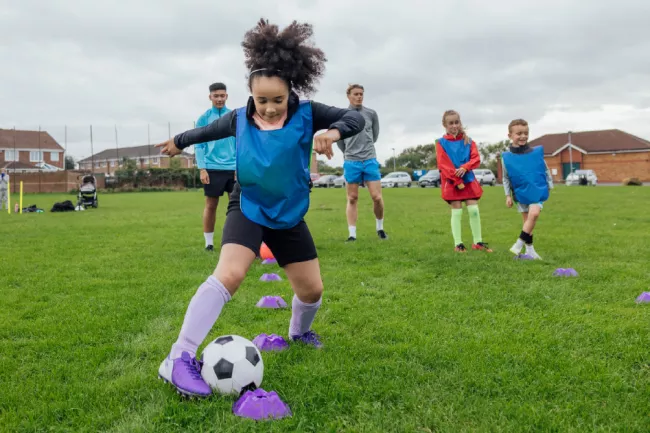
What is a concussion?
A concussion is a type of mild traumatic brain injury that results from a blow to the body or head that moves or twists the brain. This movement can temporarily bruise the brain and disrupt normal brain activity which can affect concentration, mood, and sleep. It can also lead to headaches and feelings of dizziness making children feel unsteady on their feet.
While concussions are very common, they are often misunderstood. It is important to take concussion seriously because it’s not always immediately obvious that it has occurred.
What are the signs of a concussion?
Common signs of a concussion include:
- Blurred or double vision
- Headache/nausea
- Light and sound sensitivity
- Abnormal eye movement
- Trouble focusing
- Sleep problems
- Confusion
In some cases symptoms do not become apparent until children go back to their regular activities.
What should I do if I suspect my child has a concussion?
You don’t have to lose consciousness to have a concussion. If your child has received a blow to the head or body, stop the activity immediately and assess their symptoms. Some children will downplay their symptoms because they’re embarrassed or want to keep playing, but symptoms can take time to appear and it’s important to avoid further injury.
Directly after the head strike, if a child loses consciousness, has vomiting, severe headache, worsening headache, neck pain, are altered or have any abnormal physical exam findings they should be evaluated immediately at the nearest emergency department.
Avoid aspirin or ibuprofen for the first 24 hours as they can increase the risk of bleeding.
Acetaminophen can be used to treat soreness or headache.
Monitor your child the next 24-48 hours and seek immediate medical attention if you notice any of te following:
- Severe or increasing headache
- Double vision
- Unequal pupils
- Convulsions
- Increased drowsiness
- Bleeding/clear fluid from the ear/nose
- Repeated vomiting
- Unusual stiffness in the neck area
- Personality changes
- Weakness in arms or legs
- Numbness in the face/extremities
- Worsening symptoms
Should someone with a concussion avoid sleep?
Avoiding sleep or repeatedly waking someone with a concussion is a common myth. In fact, rest is very important after a concussion and critical for helping the brain heal. While you should check on your child to make sure they’re breathing normally, there is no need to wake them.
My child’s symptoms are mild, when can they go back to their regular activities?
Most people can return to their regular activities within a few days or weeks, however in severe cases symptoms can last much longer. Continue to monitor their symptoms and encourage them to rest, get a good night sleep, take naps as needed and avoid screen time. Children should not be in bed all day and light activity such as short walks are encouraged as tolerated. Take your child to the doctor if their symptoms worsen at any point or if symptoms are not improving.
Most children can return to school in a few days but in some cases they may need to start back gradually.
Can I prevent my child from getting a concussion?
While we can’t avoid every playground accident, fall or sports injury, we can prevent and minimize the risk of concussions. Model healthy habits yourself and teach your children to:
- Wear appropriate protective headgear during sports
- Wear a seatbelt
- Use playground or other equipment safely
- Clean up trip hazards
- Listen to their bodies and recognize the symptoms and signs of concussion
Helpful resources:
Check out the CDC’s HEADS UP concussion guide for more in-depth information on concussion.
